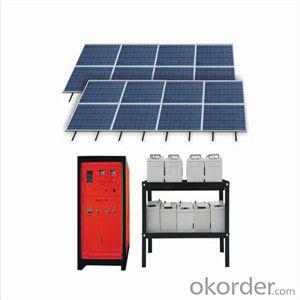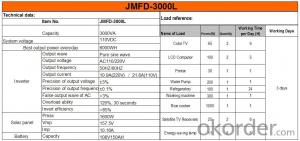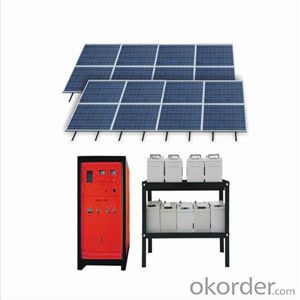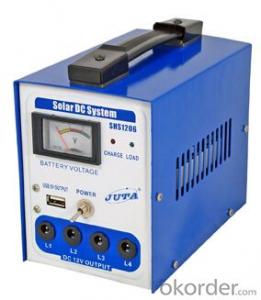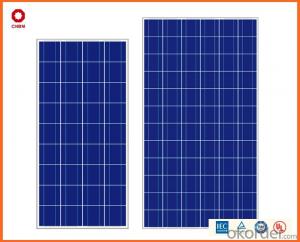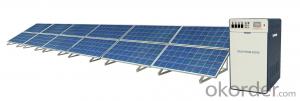Solar Energy Systems Scottsdale - Household Solar Power System JMFD-3000L
- Loading Port:
- Shanghai
- Payment Terms:
- TT OR LC
- Min Order Qty:
- 10 pc
- Supply Capability:
- 10000 pc/month
OKorder Service Pledge
OKorder Financial Service
You Might Also Like
Depending on the technical strength of Chinese Academy of Sciences, with advanced production equipments and high-quality imported electrical components, we successfully develop and manufacture two series products:
1. Solar Photovoltaic Power Station, Solar Street Lights, Solar Landscape Lights, Solar Garden Lights, Solar Lawn Lights etc.
2. Integrated Intelligent LED Power Supply, LED Street Lights, LED Tunnel Lights, LED Floodlights, LED Highbay Lights, LED Commercial, Home lightings etc.
Meanwhile, we optimize the combination of solar energy and LED lighting perfectly.Over the last few years; practice, it proves that solar street lights manufactured by Coursertech has been able to reach 365 days normal lighting out of climate impact, light decline rate of LED lightings controlled within 8% after using 30000 hours, conversion efficiency reach more than 92%, power factor reach 0.97. LED street light reflector designed by Coursertech, could increase efficiency 30% higher, has got national invention patent!
- Q: How do solar energy systems impact water usage?
- Solar energy systems have a positive impact on water usage as they significantly reduce the amount of water needed for electricity generation compared to traditional fossil fuel power plants. Solar power does not require any water for its operation, whereas conventional power plants consume large amounts of water for cooling purposes. This water consumption can be detrimental to local ecosystems and water resources, especially in areas with limited water availability. Moreover, solar energy systems indirectly contribute to water conservation by reducing the reliance on other water-intensive energy sources. By shifting towards solar power, we can reduce the need for coal or natural gas power plants that consume vast amounts of water for cooling and extraction processes. This reduction in water usage not only preserves local water resources but also helps mitigate water scarcity issues that many regions face. Additionally, solar energy systems can also be integrated with water management infrastructure to further optimize water usage. For instance, solar panels can be installed on reservoirs or other water bodies, providing shade and reducing evaporation rates. This helps to conserve water and maintain reservoir levels, which are crucial for agriculture, drinking water supply, and ecosystem health. In summary, solar energy systems have a positive impact on water usage. They eliminate the need for water consumption in electricity generation and reduce reliance on water-intensive energy sources. Moreover, solar power can be combined with water management infrastructure to optimize water usage and conserve water resources. By embracing solar energy, we can contribute to a more sustainable and water-efficient future.
- Q: How do solar energy systems impact national energy policy?
- Solar energy systems have a significant impact on national energy policy by promoting a shift towards renewable energy sources and reducing dependence on fossil fuels. They encourage the adoption of sustainable practices and help countries meet their carbon emission reduction targets. Additionally, solar energy systems foster energy independence, create new job opportunities, and enhance energy security, ultimately shaping and influencing national energy policies.
- Q: How does the location of a solar energy system affect its performance?
- The location of a solar energy system has a significant impact on its performance. Various factors such as latitude, climate, shading, and orientation play a crucial role in determining the efficiency and effectiveness of a solar energy system. Firstly, the latitude of the location affects the amount of solar radiation received. Areas closer to the equator receive more direct sunlight throughout the year, resulting in higher solar energy production. Conversely, regions located further away from the equator receive less direct sunlight and may experience lower solar energy generation. Climate also influences the performance of a solar energy system. Regions with clear skies and ample sunshine tend to have higher solar energy potential compared to areas with frequent cloud cover or a higher number of rainy days. Additionally, extreme temperatures can also impact the efficiency of solar panels, as excessive heat can reduce their output efficiency. Shading is another crucial factor to consider when installing a solar energy system. Shadows from nearby buildings, trees, or other obstructions can significantly decrease the amount of sunlight reaching the solar panels. Even partial shading on a small portion of the panels can disproportionately impact the overall system's performance, resulting in reduced energy production. The orientation of the solar panels also affects system performance. The ideal orientation for solar panels is typically facing south in the Northern Hemisphere and north in the Southern Hemisphere. This allows panels to receive the maximum amount of sunlight throughout the day. However, deviations from the optimal orientation can still be efficient, albeit with slightly reduced performance. In conclusion, the location of a solar energy system has a direct impact on its performance. Factors such as latitude, climate, shading, and orientation all influence the efficiency and effectiveness of solar energy production. Considering these factors during the planning and installation process is crucial to maximizing the potential of solar energy systems.
- Q: Can solar energy systems be used in areas with limited access to solar grounding equipment?
- Yes, solar energy systems can still be used in areas with limited access to solar grounding equipment. While proper grounding is important for safety reasons, it is not always mandatory for the installation and operation of solar panels. Alternative grounding methods, such as using ground-mount racks or ballast systems, can be employed in such areas. Additionally, off-grid solar systems with batteries can provide power even without grid connection or grounding requirements. However, it is crucial to consult with experts and adhere to local regulations to ensure safe and efficient operation of the solar energy system.
- Q: Can solar energy systems be used for heating swimming pools?
- Yes, solar energy systems can be used for heating swimming pools. Solar pool heaters use sunlight to heat the water in the pool, reducing the reliance on traditional energy sources. This is an environmentally friendly and cost-effective way to maintain a comfortable temperature in swimming pools.
- Q: How do solar batteries store excess energy?
- Solar batteries store excess energy by converting the surplus electricity generated by solar panels into chemical energy. This is done through a process called charging, where the excess energy is used to charge the battery. The battery then stores this energy as chemical potential energy, which can be later converted back into electrical energy when needed.
- Q: What is the impact of saltwater spray on solar panels?
- Saltwater spray can have a negative impact on solar panels. The salt in the water can corrode the surface of the panels, leading to a decrease in their efficiency over time. It is important to regularly clean and maintain solar panels in coastal areas to minimize the effects of saltwater spray and ensure optimal performance.
- Q: Can solar energy systems be used for air conditioning?
- Yes, solar energy systems can be used for air conditioning through the use of solar-powered air conditioning units or by using solar energy to power traditional air conditioning systems.
- Q: Are there any disadvantages of using solar energy?
- Yes, there are a few disadvantages of using solar energy. Firstly, the initial installation cost of solar panels can be quite expensive. Additionally, solar panels can take up a significant amount of space, especially when considering large-scale installations. Furthermore, solar energy generation is dependent on sunlight availability, meaning it may not be as reliable during cloudy days or at night. Finally, the production and disposal of solar panels can have environmental impacts, as they involve the use of certain chemicals and materials.
- Q: What is the lifespan of a solar battery?
- There are several factors that can affect the lifespan of a solar battery. These include the quality of the battery, the depth of discharge, the number of charge cycles, and the environmental conditions it is subjected to. The quality of the battery is extremely important as it determines how long it will last and how well it will perform. Investing in a high-quality battery can greatly increase its lifespan. Additionally, the depth of discharge, or how much capacity is used before recharging, can impact the battery's longevity. Using less capacity before recharging can help prolong its life. The number of charge cycles also plays a role in the battery's lifespan. Each charge cycle refers to the process of discharging and then recharging the battery. The more charge cycles a battery goes through, the shorter its lifespan will be. So, minimizing deep discharge cycles can help extend its life. Lastly, the environmental conditions can have a significant impact on the battery's lifespan. Extreme temperatures, whether hot or cold, can negatively affect its performance and overall lifespan. Proper temperature control and protection from harsh weather conditions can help maintain the battery's longevity. Regular maintenance and care are crucial for maximizing the lifespan of a solar battery. This includes cleaning the solar panels and ensuring the battery is not exposed to extreme temperatures.
Send your message to us
Solar Energy Systems Scottsdale - Household Solar Power System JMFD-3000L
- Loading Port:
- Shanghai
- Payment Terms:
- TT OR LC
- Min Order Qty:
- 10 pc
- Supply Capability:
- 10000 pc/month
OKorder Service Pledge
OKorder Financial Service
Similar products
Hot products
Hot Searches
Related keywords
